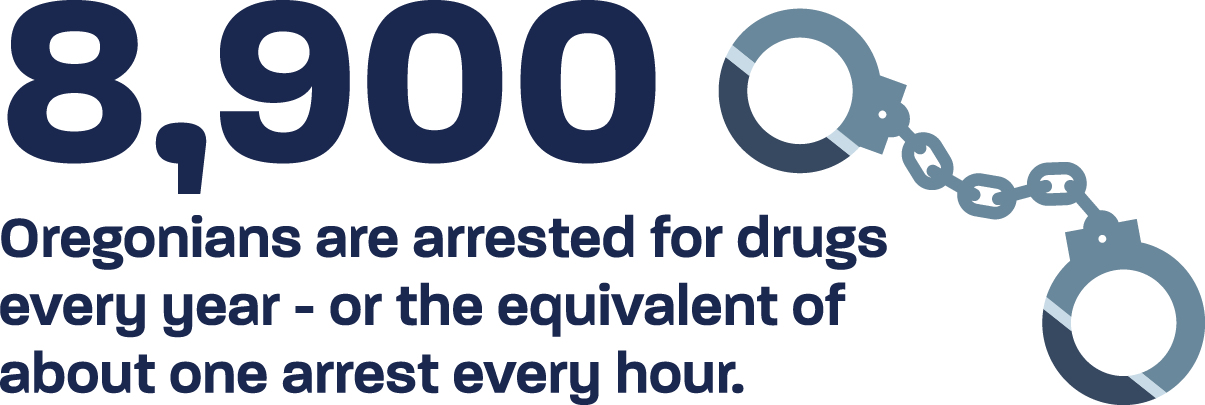Get the Facts
Oregon is in the middle of an addiction crisis. Too many Oregonians are struggling with substance use disorder. And too few of them have access to the treatment that would help them get their lives back on track. Meanwhile, our current drug laws can ruin lives based on a single mistake, preventing people from getting a job, a place to live, student loans, professional licenses, or even a credit card.

This measure expands access to treatment and removes unfairly harsh punishments for minor, nonviolent drug offenses, so people with addiction can more easily recover. People will no longer be arrested and put in jail simply for possession of small amounts of drugs. Instead, they will receive a health assessment and be connected to the right treatment or recovery services, including housing assistance, to help them get their lives back on track.
How it Works
Instead of arresting people for possession of small amounts of drugs, IP 44 will greatly expand access to drug treatment and recovery services for anyone who wants and needs them, paid for by existing marijuana tax money. This includes:
1. Establishing Addiction Recovery Centers throughout the state to immediately assess the needs of people who use drugs, and link them to treatment, care and services. These centers can be housed in or operated by existing qualified providers.
2. Increasing the availability of services, including:
- Treatment that is evidence-based, trauma-informed, culturally responsive and patient-centered;
- Peer support and recovery services so people are able to remain clean and sober;
- Housing (stabilizing and transitional) for persons with substance use disorder;
- Harm reduction interventions including overdose prevention education, access to naloxone hydrochloride and other drug education and outreach.
This Act does not legalize any drugs.
It removes criminal penalties for low-level possession of all drugs, currently classified as misdemeanors, replacing them with a fine. These fines can be waived by being evaluated at Addiction Recovery Centers, which will be made available in all parts of the state, 24 hours a day.
- No change is made in the criminal code for delivery, manufacture, and other commercial drug offenses. These offenses will remain a crime.
- No change is made for other crimes that may be associated with drug use, such as driving under the influence and theft.
Expert Supervision
The Act establishes an Oversight and Accountability Council made up of experts who work in drug treatment and recovery. It includes people from communities that have been disproportionately impacted by the status quo. Members of the Council will include:
- A physician specializing in addiction medicine.
- Three members of communities that have been disproportionately impacted by our current approach to drugs emphasizing arrests and incarceration.
- At least two people who suffered or suffer from substance use disorder.
- A licensed clinical social worker.
- A representative of the Oregon Health Authority.
- A harm reduction services provider.
- An evidence-based substance use disorder provider.
- An academic researcher specializing in drug use or drug policy.
- At least two recovery peers.
- A mental or behavioral health provider.
- A representative of a coordinated care organization.
- A person who works for a non-profit organization that advocates for people who experience or have experience with substance use disorder.
Supported by the Oregon Health Authority, the Council will determine how money will be distributed to grant applicants for increasing community access to care and implementing Addiction Recovery Centers.
Real Accountability
The Oregon Secretary of State, Division of Audits will conduct financial and performance audits. The audits, which will be publicly available, will occur at least once every two years and include data on:
- Financial oversight of grant programs, showing exactly what organizations and programs received money, how much they received, how that money was spent, how much money was used to administer the programs;
- Success in getting more treatment services to people including the outcomes of the treatment/recovery services, the wait times to receive treatment, the average duration of client participation, completion rates, recidivism, clients’ ability to receive supportive housing, employment and legitimate income.
Click here to read the full text of the measure
This Initiative Does Not Create Any New Taxes
Instead, it relies on existing marijuana tax revenue.
There is a lot more marijuana tax money than expected. When the Drug Addiction Treatment and Recovery Act takes effect, marijuana tax revenue is expected to total about $145 million a year. Revenue collected in excess of $45 million a year will go to services for treatment, recovery, harm reduction and more.
At a time that Oregon ranks near last in the nation for providing treatment and recovery services when people ask for it, this represents a 395% increase in non-Medicaid state public expenditures for substance use disorder.
More Time for Police to Focus On What Matters
Every hour, police in Oregon arrest someone for drugs—at a time when Oregon has missing children, unsolved murders and a long backlog of cold cases. This measure will free-up police to focus more on what matters.


